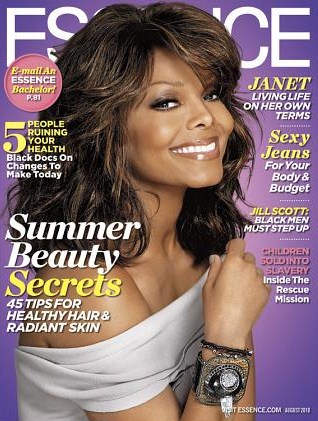
Current issue of Essence magazine, whose target audience is African-American women. (Credit: Essence.com)
Essence magazine has hired a new fashion editor, Elliana Placas. Ordinarily, a new fashion editor hiring wouldn’t be any big to-do, but Placas’ hiring has become a controversial topic on many blogs, social media and news sites because Placas is white. And Essence, “where black women come first,” calls itself “the premiere lifestyle, fashion and beauty magazine for African-American women.”
Essence editor-in-chief Angela Burt-Murray wrote in an article on The Grio (an African-American “video-centric news community site” affiliated with NBC) July 28 that Placas was hired for “her creativity, her vision, the positive reader response to her work, and her enthusiasm and respect for the audience and our brand.” Placas has been freelancing as the fashion editor for Essence for six months.
Burt-Murray wrote that the issues that she expects to “upset people” get ignored, listing Essence stories about the “plight of black children falling through the cracks in under-performing schools” and “sex trafficking of young black girls in urban communities,” as examples of stories less controversial than Placas’s hire.
“The things that really are the end of our world apparently aren’t,” Burt-Murray wrote.
Although the hire was announced on Media Bistro July 19, it was a former Essence employee who brought much attention to the hiring decision, CNN reported July 29. Michaela Angela Davis posted on her Facebook and Twitter accounts July 23 that
“it is with a heavy heavy heart I have learned that Essence Magazine has engaged a white fashion director, this hurts, literally, spiritually”
CNN wrote that Davis said, “This is not about being racist, this is about wanting a place where black women can grow and flourish and go out and help diversify.” She later posted on Facebook that boycotting the magazine isn’t the answer.
Media Bistro wrote that Placas’ first issue will be September’s 40th anniversary issue. Her job description includes overseeing “the conception and packaging of Essence’s fashion coverage, feature stories and multi-platform packages.”
Reactions to the hiring decision has been mixed.
Attorney, political commentator and communications specialist Sophie Nelson wrote for CNN July 30 that “With all due respect to the critics, Essence magazine got it right. “
Nelson, who wrote that she has subscribed to Essence since her college years, called Burt-Murray’s decision “good business sense” and is significant for putting qualifications ahead of skin color.
“What we all seem to have missed is this: Essence is giving a talented, visionary, able, energetic, qualified and well-connected woman an opportunity to contribute her talents and experience to its legendary brand. The fact that this woman happens to be white is significant and important, and I will tell you why. ”
“It is significant because so many of us sisters lament regularly how we played by the rules, worked hard, got well-educated, networked, and still, somehow, always came up short in career success. We know better than anyone how hard it is to get a fair shake out here; how hard it is to find an open door of opportunity, where we can be judged for our business acumen, ideas, our abilities, and our vision.
“Essence is setting a very positive example in the magazine industry and at one of the world’s largest corporations, Time Warner, that talent not race matters….
“The sisters at Essence have taught us all to put qualifications over comfort zones, vision over tradition, and character over color.”
Likewise, Afro wrote that Placas’ “background in journalism and fashion cannot be denied.”
Placas has worked at O: The Oprah Magazine, US Weekly, Real Simple, New York, More and Life & Style, according to Media Bistro. Afro added her work for publishing company Hachette Filpacchi, Time, Wenner Media and appearances on the “Today Show,” E! Entertainment and “Extra.”
Ta-Nehisi Coates wrote for The Atlantic July 30 that since Placas has been in this position freelance for six months now, and no one seems to have complained about her being white and its effect on the magazine. “If the blackness she lacks was so important to the way the magazine looks, wouldn’t folks have picked up on it before?”
Coates wondered why there are not more “black-targeted publications” as it is.
China Okasi, senior editor of Madame Noire, an online “publication geared towards African-American women”, wrote that “Placas doesn’t seem like some wayward woman who will rip the soul from Essence and convert all its fashion pages into bourgie and booty-unfriendly wear.”
Justin Finner at Styleite wrote July 27 that “I recognize that Placas will never fully understand a black woman’s point of view, but I also recognize that she has considerable fashion and magazine experience. Because of that, I think that so long as she does a good job generating relevant fashion coverage and supervising gorgeous editorials, she deserves her position.”
Lola Adesioye wrote in July 30 article on The Grio that “What I find particularly sad about this controversy is that those who have criticized the hiring of Elliana Placas are literally only upset about her skin color. They have not expressed concern about not whether or not she’s good enough for the job, whether or not she can uplift Essence’s sales, or whether or not she is best placed to serve Essence’s demographic. It is literally her being white that is the gripe. This is very dangerous and shaky ground.”
On the other hand, some writers are saying that being black is essential to representing Essence.
Clutch Magazine wrote July 26 wondering if Time Warner, which owns Essence, had anything to do with Placas’ hiring.
Clutch quoted Najwa Moses, who asked “How can a White woman dictate and decide what style and beauty is for the Black woman?” Moses has a fashion TV show on her website Styleaholics.com and is a style correspondent, among other things.
“I mean, how could such a prestigious title who is deeply rooted in its target audience let someone who is not even apart of the African Diaspora detonate our image?” Moses continued.
Joan Morgan, who currently writes for Essence, is quoted in Clutch as saying that “When these same institutions (naming Conde Nast, Hachette and others) start to employ hiring practices that allow Black publishing professionals the same access to their publications, that’s when I can get all ‘Kumbaya’ about Essence‘s new fashion director.”
Mark Anthony Neal, professor of black popular culture at Duke University, wrote July 31 on his blog NewBlackMan that “there is nothing progressive about whites directing or overseeing black intellectual and cultural production.”




